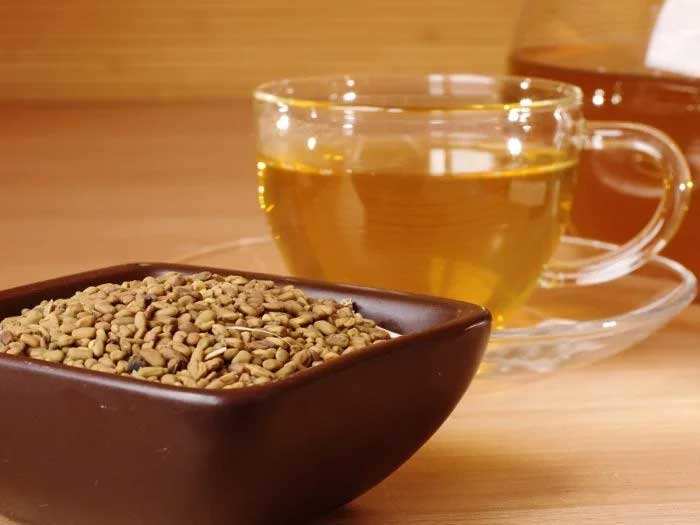
Fenugreek tea has an incredible list of properties and health benefits, which may include the ability to soothe menstrual cramps, lower blood sugar, promote proper digestion, protect the heart, stimulate the sex drive, eliminate inflammation, speed the healing process, detoxify the body and increase circulation, among others. There may also be a number of potential side effects when too much tea is consumed or for those who are allergic to fenugreek or other plants in the Fabaceae family, such as soybeans. These side effects can include diarrhea, bloating, gas, nasal congestion, and facial swelling, but these are not common.
What is Fenugreek Tea?
Fenugreek tea is made from the seeds of the fenugreek plant, which has the scientific name Trigonella foenum-graecum. It is a small bush with pale yellow flowers and seed pods, which contain the light brown seeds. The seeds are where the majority of the nutrients are located in fenugreek, and as such, these seeds have been widely used in traditional medical applications for thousands of years, dating back at least to the Egyptians. They are also widely seen in traditional Chinese medicine; many of the ancient uses for this herbal tea remain popular applications today. Most of these benefits are the result of fenugreek’s unique nutrient composition, featuring high levels of iron, potassium, calcium, selenium, and zinc, as well as phytonutrients, vitamin A, vitamin C, and various B-family vitamins. [1]
Benefits of Fenugreek Tea
The most impressive health benefits may be for those who suffer from inflammatory conditions, indigestion, constipation, high blood pressure, diabetes, painful menstrual cramps, toxicity, anemia, obesity, arthritis, and fever.
May Improve Digestive Health
For people suffering from constipation, bloating, cramping, or other gastrointestinal issues, fenugreek tea can be excellent at relieving these issues. Perhaps as a natural laxative, this tea can stimulate peristaltic motion and smooth muscle function to flush out the body and get the digestive tract working normally.
May Help Treat Arthritis
Potentially anti-inflammatory compounds found in this herbal tea can be great for people suffering from arthritis, gout, and other inflammatory conditions. This reduction of symptoms in chronic disease is probably due to the antioxidant phytonutrients that are in the seeds. [2]
May Help Protect Heart Health
Studies have directly linked the use of fenugreek tea to lower blood pressure and lower levels of cholesterol. Both of these properties can help cardiovascular health in a major way, significantly reducing your chances of developing atherosclerosis or suffering a heart attack or stroke. This tea can also be anticoagulant in nature, meaning a reduced risk of blood clots. [3]
May Regulate Blood Sugar
Fenugreek has some blood glucose-lowering properties to it. As per a study published in the Journal of Diabetes and Metabolic Disorders, [4]fenugreek supplementation may increase the levels of serum insulin and therefore has a hypoglycemic effect on the body.
May Help Reduce Menstrual Cramps
Fenugreek tea has been used for thousands of years to reduce menstrual cramps in women, as well as soothe some of the other side effects, such as mood swings and hormonal fluctuations. The tea is also known to help minimize hot flashes, possibly making it good for menstruation and menopausal situations. [5]
May Help Stimulate Urination
This tea is a natural diuretic, meaning that it can help detoxify the body quickly by stimulating urination. This can eliminate excess toxins, fats, salts, and water from the body, reducing the strain on the kidneys and other organs to process and eliminate toxins. [6]
May Increase Circulation
High levels of iron found in fenugreek tea can help people avoid the symptoms of anemia, also known as an iron deficiency. Iron is a crucial part of red blood cells, and when more RBCs can be produced, more parts of the body can be properly oxygenated, maximizing bodily function and repairing any damage quickly. [7]
May Aid in Weight Loss
This particular tea has shown appetite-suppressing qualities, which can make it a favorite of people who are trying to lose weight. It can provide a number of critical nutrients and vitamins, but doesn’t tack on calories to your daily diet and prevents you from overeating or snacking between meals. [8]
May Boost Immune System
Fenugreek tea has often been prescribed to people with respiratory infections, as it can quickly cut through the phlegm and mucus, and neutralize the underlying pathogen. In this way, the antioxidants and vitamins in this tea give the immune system a major boost. The vitamin C content alone can be enough to stimulate the production of white blood cells and act as the body’s primary line of defense against pathogens and bacteria. [9]
How to Make Fenugreek Tea?
Fenugreek tea is extremely easy to make at home, and only requires a handful of fenugreek seeds, hot water, and some honey or sugar to use as a sweetener.
Fenugreek Tea Recipe
While most teas are brewed with leaves, flower buds or roots, fenugreek tea is prepared with the seeds of the fenugreek plant. In order to release the nutrients and flavor of fenugreek, it is required that you lightly crush the seeds. You don’t need to turn them into powder, but gently crushing them with a wooden spoon will do wonders for the flavor of the tea.
Ingredients
- 1 tsp fenugreek seeds [12] lightly crushed
- 1 cup water filtered
- 1 dash nutmeg [13]
- 1 tsp honey organic
Instructions
- Bring the water to a simmer in a saucepan. The water should not be boiling.
- Add the fenugreek seeds to the water, along with any other herbs you may want to include for extra flavor and health benefits. The flavor of fenugreek is quite mild and pairs well with several other herbal tea preparations.
- Allow the seeds to simmer in the water for roughly 3 minutes, and then remove the pan from heat.
- Let the seeds steep for an additional 15 minutes to release more of the beneficial nutrients; unlike leaves, seeds can take slightly longer to brew.
- Strain the mixture into your teacup, add the nutmeg and honey, and enjoy!
Fenugreek tea can also be easily found at major grocery stores and health food chains, including Walmart, Walgreens, GNC, and Target. Its seeds, powder, and leaves are all available at some of these locations, in addition to smaller-scale natural health food stores and herbalists.
Is Fenugreek Seed Tea Safe to Drink?
Fenugreek seed tea is safe to drink in most cases, although there is a risk of certain side effects, such as gastrointestinal distress, nausea, vomiting, facial swelling, coughing, and wheezing. These side effects primarily affect people who are allergic to fenugreek or other members of the Fabaceae family, which includes peanuts and soybeans. However, there are some other risks to consider before adding fenugreek tea to your daily health routine. [14]
- Pregnancy: One of the side effects of fenugreek tea is uterine contractions, which can cause premature labor in pregnant women, and in early-term pregnancies, it can result in miscarriages or abortions. However, later in pregnancy, some people use fenugreek tea to intentionally stimulate labor.
- People with diabetes: Fenugreek tea is very good at lowering blood sugar, but for people with diabetes who are already on a medication to lower their blood sugar, this can be dangerous and may result in lightheadedness or fainting. Be sure to monitor your blood sugar closely if drinking this tea, and speak to your doctor before adding it to your diet.
- Anticoagulant – This herbal tea helps to prevent blood clotting, which can improve heart health, but for patients already taking warfarin or other drugs, there can be unpleasant side effects. Do not drink this tea if you are undergoing surgery in the near future.
Important Notice: This article was originally published at www.organicfacts.net by where all credits are due.
Disclaimer
The watching, interacting, and participation of any kind with anything on this page does not constitute or initiate a doctor-patient relationship with Dr. Farrah®. None of the statements here have been evaluated by the Food and Drug Administration (FDA). The products of Dr. Farrah® are not intended to diagnose, treat, cure, or prevent any disease. The information being provided should only be considered for education and entertainment purposes only. If you feel that anything you see or hear may be of value to you on this page or on any other medium of any kind associated with, showing, or quoting anything relating to Dr. Farrah® in any way at any time, you are encouraged to and agree to consult with a licensed healthcare professional in your area to discuss it. If you feel that you’re having a healthcare emergency, seek medical attention immediately. The views expressed here are simply either the views and opinions of Dr. Farrah® or others appearing and are protected under the first amendment.
Dr. Farrah® is a highly experienced Licensed Medical Doctor certified in evidence-based clinical nutrition, not some enthusiast, formulator, or medium promoting the wild and unrestrained use of nutrition products for health issues without clinical experience and scientific evidence of therapeutic benefit. Dr. Farrah® has personally and keenly studied everything she recommends, and more importantly, she’s closely observed the reactions and results in a clinical setting countless times over the course of her career involving the treatment of over 150,000 patients.
Dr. Farrah® promotes evidence-based natural approaches to health, which means integrating her individual scientific and clinical expertise with the best available external clinical evidence from systematic research. By individual clinical expertise, I refer to the proficiency and judgment that individual clinicians acquire through clinical experience and clinical practice.
Dr. Farrah® does not make any representation or warranties with respect to the accuracy, applicability, fitness, or completeness of any multimedia content provided. Dr. Farrah® does not warrant the performance, effectiveness, or applicability of any sites listed, linked, or referenced to, in, or by any multimedia content.
To be clear, the multimedia content is not intended to be a substitute for professional medical advice, diagnosis, or treatment. Always seek the advice of your physician or other qualified health providers with any questions you may have regarding a medical condition. Never disregard professional medical advice or delay in seeking it because of something you have read or seen in any website, video, image, or media of any kind. Dr. Farrah® hereby disclaims any and all liability to any party for any direct, indirect, implied, punitive, special, incidental, or other consequential damages arising directly or indirectly from any use of the content, which is provided as is, and without warranties.








